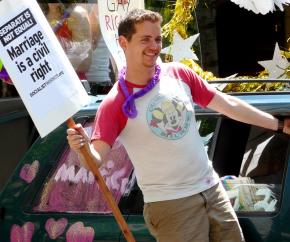Marriage equality victory in D.C.
reports on a new step forward in the movement for LGBT equality.
THE DISTRICT of Columbia--home to one of the nation's largest out LGBT populations--has begun performing its first same-sex marriages.
In May 2009, the Washington, D.C., City Council voted by an almost unanimous margin to recognize out-of-state marriages, under pressure from the marriage equality bill. This was followed by legislation granting full rights for same-sex marriage. The new law went into effect March 3 after the required waiting period of 30 congressional legislative days--a period when the U.S. Congress gets to "review" all D.C. laws.
Despite some posturing by anti-gay bigots in Congress, the right ultimately stayed silent, due in important ways to the confidence of a reenergized LGBT rights movement that took to the streets last fall for the National Equality March.
On March 3, more than 100 same-sex couples waited in line to apply for marriage licenses. The couples were a diverse group both racially and economically, and included many who had been partners for decades. Some had been utilizing for years D.C.'s progressive domestic partner benefits, but were elated to finally be getting married, and they were cheered on by a small crowd of supporters.
Then, on March 9, after waiting the requisite three business days for their licenses to be issued, many of these couples were married in a joint ceremony and celebration. The mood was jubilant as three African-American couples said their vows before family and friends, supporters and the media. An estimated 2,000 same-sex couples will be married in D.C. in the next few years, with thousands more traveling to Washington from nearby states.
Kareem Murphy and his partner of 19 years are looking to moving from Maryland to D.C. to take advantage of the right to marry. Although the Maryland attorney general recently stated that Maryland can and should begin to recognize same-sex marriages performed elsewhere, such a move will be challenged by the right.
Murphy expressed his happiness about marriage equality in D.C. "We've been waiting almost 20 years for this," Murphy said. "For us, it's a wonder and joy that the law finally caught up with our love for another."
However, Murphy, an activist with the Equality Across America affiliate Full Equality Now D.C., explained, "We remain concerned that we may lose this right. So it's critically important that we remain engaged to make sure it's not taken away."
THE FIGHT for marriage equality in D.C. wasn't without its challenges from the right as well. However, existing D.C. human rights laws, the conviction of most council members, and overwhelming support from the LGBT community made it harder for these attempts to gain traction.
One attack came from council member Marion Barry. Although he has been a supporter of LGBT rights in the past, he is now attempting to pit the African American community of his district against the LGBT community. His divide-and-conquer tactic failed, since African Americans in D.C. are, on the whole, supportive of LGBT rights.
Bishop Harry Jackson of Maryland and the National Organization for Marriage, which recently moved its headquarters to D.C. to fight gay marriage, also attempted to block progress by rallying the religious community and attempting to get a referendum against marriage equality on the ballot. Jackson and his organization were effectively countered by a broad coalition of more than 100 D.C. clergy from all faiths. In addition, the referendum drive was hindered by the D.C. Human Rights Act, one of the most progressive of its kind.
The Catholic Church, in one of its most cynical moves to date, threatened to stop administering all services for the city--including homeless shelters, among others--if same-sex marriage passed. Since the law went into effect, the church didn't shut down its services, but it did prohibit all employee spouses not currently on the books from getting any benefits--in other words, punishing both its straight and gay employees out of spite.
The struggle for same-sex marriage in D.C. involved a wide range of tactics. Marriage equality activists held rallies, had the largest and most political contingent in last year's Pride parade, collected thousands of petition signatures, and turned out in record numbers for hearings on bills and on whether to allow the anti-marriage referendum on the ballot.
Most of the work was led by the group D.C. for Marriage and the coalition of faith leaders Clergy United for Marriage Equality, with the last big rally initiated by the coalition Campaign for All D.C. Families.
Full Equality Now D.C. also contributed to the fight by initiating a rally the day after the defeat of LGBT marriage rights in Maine last year. In this rally, we reaffirmed our commitment to marriage equality in the District, while also understanding the context of the Maine loss and calling for a national movement fighting for full federal equality.
It is important to note that the newly married same-sex couples in D.C. are still denied federal rights prohibited by the Defense of Marriage Act, signed into law during Bill Clinton's presidency.
We want to deepen the struggle for marriage equality by setting our sights on federal rights as well--and making it harder for the right wing to roll back hard-won rights in each state. And we want to help in any way we can to take this important victory in D.C. and use it to fight for all the basic rights that each LGBT person in this country deserves.



